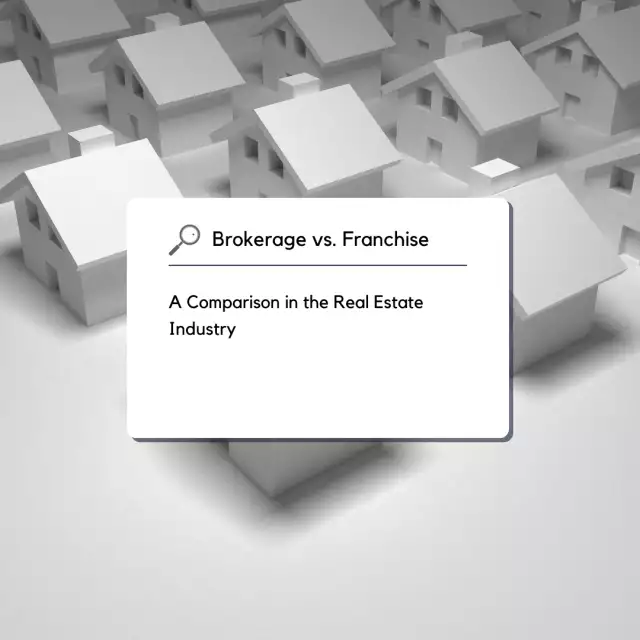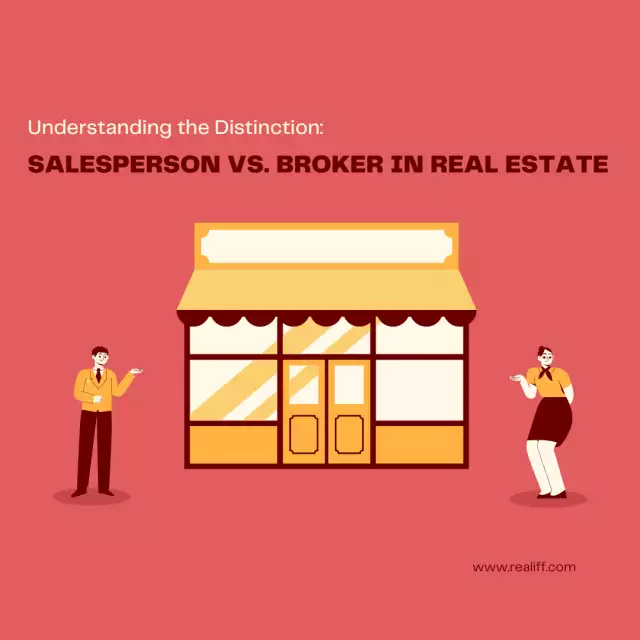Brokerage vs. Franchise: A Comparison in the Real Estate Industry
Brokerage vs. Franchise: A Comparison in the Real Estate Industry
In the competitive world of real estate, professionals often face the choice between joining a brokerage or becoming part of a franchise. Both options offer unique advantages and considerations. This blog post aims to provide a comprehensive comparison of the brokerage and franchise models within the context of the real estate industry. By exploring key aspects such as structure, brand recognition, support and training, flexibility, autonomy, and financial considerations, readers will gain a deeper understanding of these two pathways and be better equipped to make an informed decision.
Definition and Structure:
A brokerage is an independent real estate company or agency that operates under a specific brand or name. It is typically owned by one or more brokers who oversee agents and their transactions. Brokers can establish their own identity and build their brand within the local market. On the other hand, a real estate franchise involves affiliating with a larger established brand or company. Franchisees pay fees and follow guidelines set by the franchisor while operating under the brand's name and utilizing its resources. The franchise model provides a ready-made brand and support system, but franchisees have to adhere to certain guidelines and may have limited flexibility in decision-making.
Brand Recognition and Reputation:
Brokeragesoperate as independent entities and, as such, are responsible for building their own brand and reputation in the local market. The success of a brokerage largely depends on the efforts and reputation of its agents and brokers. Conversely, real estate franchises benefit from the established brand name and reputation of the parent company. The franchisee leverages brand recognition to attract clients and establish credibility more easily. Potential clients may have more trust in a recognized brand, which can provide a competitive edge in a crowded marketplace. However, it is important to note that building a strong brand as a brokerage is not impossible. With consistent marketing efforts, exceptional service, and a strong track record, brokerages can create their own recognizable brand and reputation within their local community.
Support and Training:
Support and training play a crucial role in the success of real estate professionals. Brokerages offer varying levels of support and training to their agents. The nature and extent of support often depend on the size and resources of the brokerage. Some brokerages may provide comprehensive training programs, mentorship opportunities, and marketing support to help agents succeed. However, in smaller brokerages, the level of support may be more limited.
On the other hand, franchises typically offer comprehensive training programs and ongoing support to their franchisees. Franchisors understand the importance of consistency and provide access to proven systems, technology, marketing resources, and professional development opportunities. Franchisees can benefit from the collective knowledge and experience of the franchise network. The support and training provided by a franchise can be particularly advantageous for individuals who are new to the real estate industry or who prefer a structured approach to their business.
Flexibility and Autonomy:
Flexibility and autonomy are important considerations when deciding between a brokerage and a franchise. Agents working under a brokerage have more freedom and autonomy in decision-making. Franchise guidelines or restrictions do not bind them and have the ability to shape their business according to their preferences. Brokers within a brokerage can set their commission splits, determine their marketing strategies, and make independent decisions regarding their clients and transactions. This level of flexibility allows for a more personalized approach to the business, which can be appealing to agents who value independence and creativity.
On the other hand, franchisees operate within the framework and guidelines set by the franchisor. While this can provide a sense of stability and a proven business model, it may also limit flexibility and creativity. Franchisees must adhere to the brand standards and guidelines established by the franchisor. This includes using approved marketing materials, following specific operational procedures, and conforming to the overall brand image. While some individuals may find comfort in having a structured framework to follow, others may feel restricted by the franchise's rules and regulations.
It's important to note that franchisees often strike a balance between providing a proven system and allowing some degree of customization. Franchisors may offer a range of options within their established framework, allowing franchisees to tailor certain aspects of their business to their local market. However, the level of flexibility granted can vary from franchise to franchise.
Costs and Financial Considerations:
When it comes to costs and financial considerations, there are differences between brokerages and franchises. Joining a brokerage generally involves fewer upfront costs compared to starting a franchise. Agents typically pay a portion of their commissions as a split with the brokerage. This arrangement allows agents to minimize initial expenses and focus on building their business.
On the other hand, franchisees typically incur higher initial costs. These costs include franchise fees, which grant them the right to use the franchisor's brand and resources, as well as ongoing royalty payments based on a percentage of their revenue. Franchisees may also be responsible for contributing to a marketing fund used to promote the brand at a regional or national level. While these financial obligations can be substantial, franchisees gain access to a recognized brand and established systems that can potentially lead to increased businessopportunities.
Additionally, joining a franchise often provides economies of scale in purchasing power. Franchisees can benefit from negotiated discounts on supplies, equipment, and technology, which can help offset some of the initial investment.
Conclusion
Choosing between a brokerage and a franchise in the real estate industryrequires careful consideration of individual preferences, goals, and resources. Brokerages offer more independence and control, allowing agents to build their own brands and operate with flexibility. Franchises, on the other hand, provide the advantage of a recognized brand, comprehensive support and training, and established systems. By weighing factors such as brand recognition, support and training, flexibility, autonomy, and financial considerations, real estate professionals can make an informed decision that aligns with their long-term goals and aspirations in the industry.







